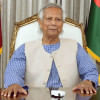The legality of the interim government

The constitutionality of the current interim government of Bangladesh can be analysed from two perspectives: firstly in consonance with Kelsen's Grundnorm theory following a revolution and the drastic change in circumstances that follow, and secondly in light of the present constitution.
The Constitution of the People's Republic of Bangladesh is the supreme law of the land and, as its Article 7 (2) states, it is the solemn expression of the will of the people. Reading as such, along with Kelsen's Grundnorm theory, which enunciates that the law of the land emanates from a Grundnorm or the basic rule that births all other rules found in that legal system, it means that the Grundnorm is the will of the people. The evolution, or change of a Grundnorm, occurs at the instance of a successful revolution. Following the revolutionary events in Bangladesh in the months of July and August in 2024, it is safe to say that both a revolution and a significant shift in the will of the people have occurred.
This shift can be identified through two lenses: i) academic; and ii) political or through the naked eye. From an academic standpoint, the rallying of people against a tyrant regime and the subsequent resignation of the then prime minister is a mark of revolution from a procedural and academic standpoint. In the naked eye, the people flooding the streets in visible jubilation following the fall of the despotic regime as a result of weeks-long mass protests, unrest, and bloodshed is an invariable display of the shift of public will—the mark of a successful revolution and the subsequent shift, in other words the creation of a new Grundnorm.
The characterisation of these events as a revolution may be concretised by two key factors: the fact that the prime minister resigned, and that she left for another country in search of refuge. Following her resignation and subsequent departure, the law enforcement agencies, which had done her bidding even till the very last minute of her stay inside the country, were nowhere to be found. Meanwhile the army, which was deployed on the streets, expressed support to the people on the streets. And even more so, as evidence of a successful revolution, two student leaders took seats in the newly formed interim government as representatives of the movement. Furthermore, the formation of the interim government was not based on the will of any particular group of people. It was the collective expression of the representatives of the major political parties in the country, leaders of the student-led mass uprising, key members of the civil society, etc. that led to the formation of the council of advisers of this interim government.

Under the present constitution, for the sake of debate, to entertain Article 57 (3) pertaining to the ability of the prime minister, after resigning, to still hold office until the next prime minister takes office, such application would be null and void given the fact that the prime minister is not present in the country, or at her office following her resignation. Hence, the question of whether she holds office till the next prime minister comes is irrelevant, since she left her office invariably for another country, rendering herself unavailable as opposed to the constitutionally prescribed method of resigning.
Hence, in tandem with the legality through the shift and stabilisation of the Grundnorm towards the interim government, and through the application of the effective control theory where all the state's machineries are under effective control of the interim government, this government is not just legal but also constitutional. A successful revolution may lead to changes in the law of a country ("When and why does the Grundnorm change?"; The Cambridge Law Journal).
Under the present constitution, for the sake of debate, to entertain Article 57 (3) pertaining to the ability of the prime minister, after resigning, to still hold office until the next prime minister takes office, such application would be null and void given the fact that the prime minister is not present in the country, or at her office following her resignation. Hence, the question of whether she holds office till the next prime minister comes is irrelevant, since she left her office invariably for another country, rendering herself unavailable as opposed to the constitutionally prescribed method of resigning. This created a unique situation which neither happened in our history, nor does our constitution explicitly provide for it. The former prime minister's fleeing from Bangladesh made it practically impossible for her to hold the office till the appointment of her successor. In such a unique situation, which seemingly lays outside of the periphery of what exists as constitutional law in Bangladesh, it necessitates the actions of the president, and if need be, the collaboration with the chief justice in conjunction with Article 106 of the constitution, in formulating a new interpretation of constitutional principles that deal with the situation and pave a path forward.
There is a misconception that following the prime minister's departure from the country either by resignation or otherwise, there was no government in the country, whereas in the absence of the prime minister, the president was still in office, therefore there evidently was a government. The formation of the interim government led by Dr Muhammad Yunus was overseen by the president, which goes in line with the aforementioned constitutional law principle, since the vacuum created by the absence of the prime minister altogether elevates the duties of the president, thus instating this government as legal and de jure. Another significant characteristic of this government is that there has been no opposition to the formation and operation of this new government, which clearly shows that the people of Bangladesh including all political parties and the state organs have generally accepted it. Moreover, Articles 57 (3) and 58 (4) of the constitution stipulate that the prime minister and the cabinet of ministers will continue to hold their offices until their successors have entered the offices. The word "successor" is critical as it does not explicitly mandate a new prime minister or a cabinet of ministers to be appointed. From this perspective, their "successors" in the newly formed interim government, which the president appointed after taking the advisory opinion of the Supreme Court, gain legitimacy under the present constitutional scheme too.
In international law, there are two different terms used to describe different governments: de jure and de facto. De jure is recognition by law and de facto is control in fact. The president, with the utmost responsibility of the state, swearing in this interim government gives it legality, enunciating it as a de jure government, while consequently the effective control the interim government gained over state machinery—whether it be through the controlling of civil servants, law enforcement agencies or otherwise and through the emphatic and visible support of the people at large—proves this interim government to be the de facto government as well. Moreover, the recognition of the international community—the United Nations as well as various countries—and their willingness to work with this new government is also a very important characteristic of a valid government of a country in this era of modern international law.
This column does not aim to solve all the problems that have arisen out of the current constitutional crisis, but to raise relevant issues in concordance with the current situation so that they may be penultimately pondered over, researched, articulated and then implemented as suitable concrete solutions in the future. There is no one side taken throughout this text, rather multiple analyses made from a bird's eye view of the situation, taking into consideration the plethora of factors and circumstances relevant to it.
The legality of the present interim government is justified based on both Kelsen's theory and the existing constitutional law of Bangladesh. Thus, this government's legality can be established from jurisprudential, constitutional and international legal perspectives.
Dr Muhammad Ekramul Haque is professor of comparative constitutional law at the Department of Law in the University of Dhaka, and senior research fellow at the Constitutional Studies Program in the University of Texas at Austin, US. He can be reached at [email protected].

 For all latest news, follow The Daily Star's Google News channel.
For all latest news, follow The Daily Star's Google News channel. 











Comments